Finding muse in misery
Gaza artist Ahmad Mahna is transforming food aid cartons into paintings
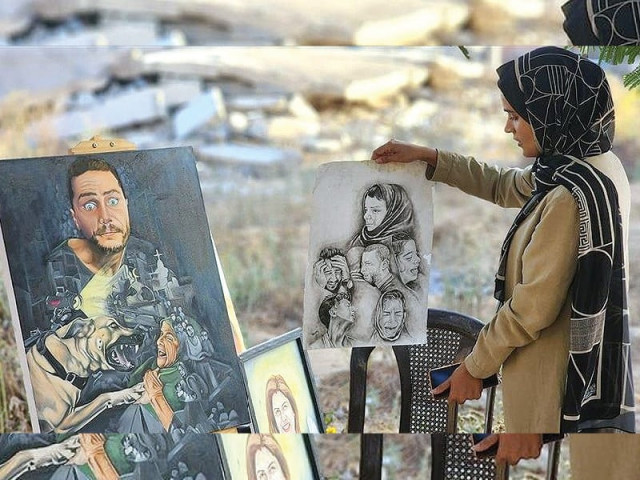
Ahmad Mahna has found a unique way to document the suffering of displaced Palestinians by painting on food aid cartons, as the Gaza Strip endures a relentless siege by Israel.
Mahna, 38, resorted to using food aid cartons for his artwork after running out of paper because of the Israeli blockade. Through his creativity and talent, he conveys the plight of the displaced with his art.
The artist discovered that transforming food aid cartons into artwork allowed him to connect the humanitarian crises faced by Palestinians with the ongoing displacement, severe blockade, and shortages of food and water.
Artistic philosophy
“I received significant appreciation from people for how I connected scenes of war with food aid cartons,” he said while holding his brush in his showroom in Deir al-Balah in central Gaza.
“The combination of artistic drawings and food aid cartons represents a kind of artistic philosophy, especially since we only see these food parcels during the war. And the paintings — they relate to scenes of daily suffering in war,” he told Anadolu.
Among the scenes documented are “children’s struggles while filling water containers, injured children, others in need of relief, and scenes of hunger, thirst, and pain.”
He said the idea is that the food parcels we see in war can carry messages of hope and suffering simultaneously.
Conveying messages
“The messages I want to convey to the local and global community are how oppressed and downtrodden we are, and how our dreams before the war have faded and become a mirage,” he said.
Mahna explained that displaced individuals are currently focused on securing daily necessities and searching for essentials — water, food, medicine and gas.
His artwork on social media features titles like A Battle for Survival and Devoid of Hope, drawing on poet Mourid Barghouti’s words: “Hope itself is painful when it is the only thing left.”
The artist hopes his drawings will send a powerful message to the world that “we do not want war; we want to live. We want children to return to school and resume their education after losing an entire academic year.”
He highlights the need for a well-organised and comprehensive health and education system to ensure a dignified life for Palestinians in challenging circumstances, pointing to the suffering of children in Gaza from malnutrition and lack of education.
Mahna urged all artists to “convey messages about Palestinian suffering, daily life during war, displacement and destruction through their art, as each artist has a unique way of expressing hardship.”
“I draw daily scenes using charcoal colours, which differs from my previous focus on self-development themes,” he said.
Despite the harsh conditions, Mahna remains hopeful. “We can never lose hope; it will always persist.”
Through his art, Mahna illustrates the close connection between food baskets and his drawings, especially those related to global food aid, emphasising that art can simultaneously be a voice for suffering and hope.
Artistic journey
“My interest in art began when I was a child. I developed my talent independently until I reached university and studied fine arts,” said Mahna, who graduated from Al-Aqsa University with a fine arts degree in 2006.
The artist has been showcased in numerous international and local exhibitions and held a solo exhibition in 2021. Mahna worked at the Abdel Mohsen Al-Qattan Foundation as an art facilitator for children before the current onslaught by Israel, using art as a form of psychological therapy. With the outbreak of the war, Mahna’s perspective on art changed significantly.
“The war provided me with strong motivation to work and visual inspiration from daily war scenes, whether on television or online,” he said. “My drawing style and thinking have changed greatly. We now depict the daily suffering and pain we endure.”
Flouting a UN Security Council resolution demanding an immediate cease-fire, Israel has faced international condemnation amid its continued brutal offensive on Gaza since an October 7 attack by the Palestinian resistance group Hamas.
Nearly 39,200 Palestinians have since been killed, mostly women and children, and over 90,400 injured, according to local health authorities.
Over nine months into the Israeli onslaught, vast tracts of Gaza lie in ruins amid a crippling blockade of food, clean water and medicine.
Israel is accused of genocide at the International Court of Justice, which ordered Tel Aviv to immediately halt its military operation in the southern city of Rafah, where more than 1 million Palestinians had sought refuge from the war before it was invaded on May 6.

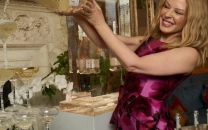
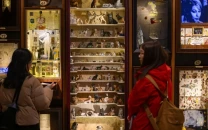
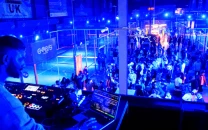


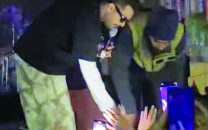











COMMENTS
Comments are moderated and generally will be posted if they are on-topic and not abusive.
For more information, please see our Comments FAQ